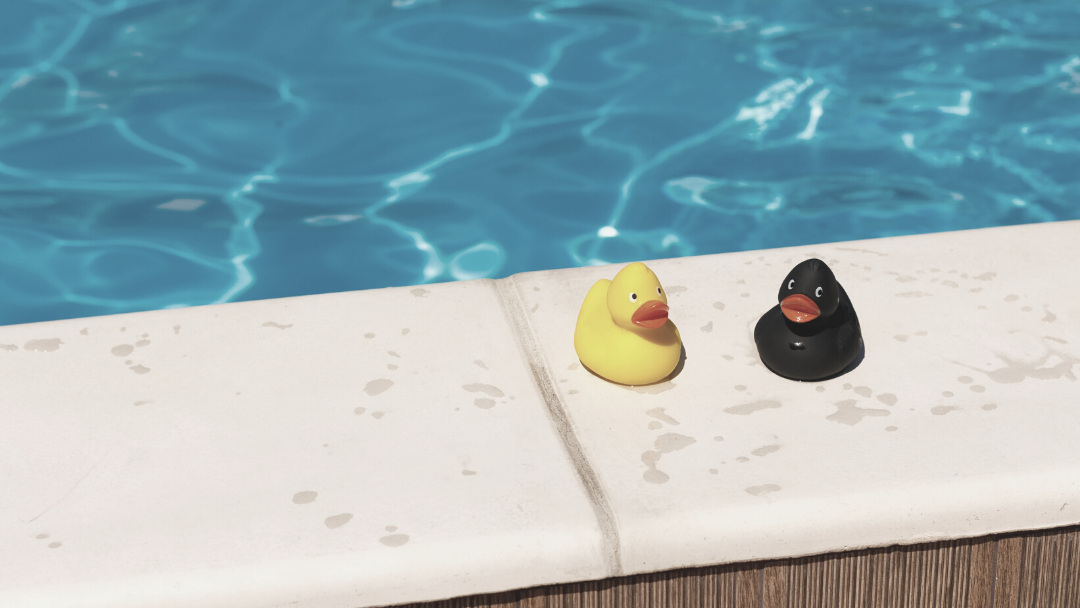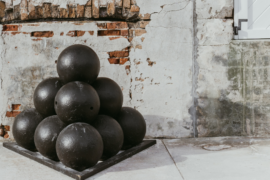BABY BOY HAS DROWNED. Padrino is the last to notice. He doesn’t unplug his ear buds until The Old Man is pumping Baby Boy’s chest and mouth-to-mouthing. The last of the pool’s wake settles with a tube that looks like a tire floating towards the pavers. Two German Shepherds scratch the latch from the top deck to the pool and rush down.
Mimi is screaming and attempting 911 on her cellphone. The impatience of the moment forbids her from staying on the line with the dispatcher. She hollers an address and panics. The phone is thrown somewhere in the mulch over her shoulder. Padrino grabs it and tries to remain on the line, but the call is dropped. He thinks the police are useless in a situation like this. The police cannot save a drowned kid. That’s the job of everyone, at some point, but not the cops. Not this time.
The family’s case, Baby Boy on the pavers, is unusual. For cases like this, usually a neighbor gets into the yard at night and falls in. Shoddy gate, lock, fence perhaps. Consider also innate intelligence by the young mischief, or a knack for avoiding obstacles. What kid doesn’t swim in neighboring pools at night? Then there is the moment of tragedy to consider. The instance no one wants to picture. Finding a boy that way, on the top or on the bottom and grey/blue.
Some local news coverage thereafter. Finally the law steps in. Civil suits, perhaps, or maybe pushback for a law change. Next year all pools must be surrounded by Diversitec gates, secured with KryptoStregth locks. Every fence must stand five feet high. No exceptions.
The only movement from Baby Boy on the pavers comes from the droplets of pool water spreading off his bathing suit. Everything else is still. When the family feels back for this memory, they will no doubt say and agree, “The moment moved both fast and slow.” Although the violent action of drowning is over, the moment is not. The horror lingers in the air with the smell of charcoal. The family cannot simply snap out of it, although they wish, of course, they could. When they think back on the moment that moved both so slow and so fast, they will also remember Padrino with his headphones in and The Old Man searching for Swimmers Ear. They’ll remember the dread in their chests when the logic of the moment materialized and no miracle would come no matter how hard they begged.
When blame is to be placed, no one will blame Mimi. Mimi cooked and cleaned up dinner and didn’t even eat. Not really. She drank. She filled other’s drinks and cut hotdogs for Baby Boy and went up and down the stairs to the kitchen on an endless loop. No, with all the duties of a Mimi, she could not also be expected to keep an eye on Baby Boy all day. Not this day. Not while everyone else was closer and more able. And furthermore, Mimi had kept eyes on her three children, now grown, and weren’t they still breathing? Hadn’t they turned out better than OK?
Sure they will blame Padrino. Easy target. Even with headphones on, he should have seen Baby Boy go in, they’ll say. He should have been facing the pool. He’ll take on the blame, live endlessly in regret. They’ll ask, Why were headphones so important to Padrino anyway? Whose padrino has ear buds and skateboard shoes and a wallet with Velcro? It should also be considered that Padrino never asked to be godfather to his older brother’s son. Padrino was still young, still considered himself very much a son and not a father of any kind. Still felt himself part of the ones looked after and not the ones who watch. Perhaps this was why Padrino was not watching Baby Boy play on the steps leading into the low end.
Some may blame The Old Man, the one with the most experience. But The Old Man would tell the blamers himself that all the family was, of course, his, made by him, his DNA and his blood, and without him none of these still breathing members of the family would be here at all. No one would swim by the pool on days less ruined, or vacation to Lake George, or come out of college across the country completely free of debt.
Suppose you did not want to blame the present company. Perhaps Mom & Dad are to blame? If Mom & Dad had not been busy working while the rest of the family tried to take care of Baby Boy and make sure he had fun? Certainly Mom & Dad would be to blame for not setting proper boundaries with Baby Boy, not being stern enough with line crossings and bed times and all. Of course, though, it’s hard to blame Mom & Dad when Baby Boy dies. At least at first. Don’t we blame the parent of a kid left in a hot car? Don’t we blame the father who’s late picking up his son from practice when he’s abducted? No doubt we blame the parent who does not properly buckle his child into a car seat.
When the list of blamees gets thin, might blame be cast on a more divine power? Might God be to blame for Baby Boy laid out on the pavers, almost completely dry by now from the heat. Shouldn’t He spare a loving family the horror of pressing their lips to the dead, futile pumps at his tiny chest? Would He let a life be cut so short on a sun-filled day in July?
After blame no longer makes a difference, perhaps the family will move on. Or, more likely, they will all remember the day in a sort of fog that makes their stomachs ache every time they smell charcoal and chlorine. Likely they will be up at night with similar still-frame memories. Mimi will see the grey blur of Baby Boy underwater. The Old Man might see the Swimmers Ear drops in the back of the medicine cabinet years later and feel the pang. Padrino will remember the song in his headphones. The cash in his velcro wallet. The brand of beat up skate shoes, Lakai. But he won’t remember the moment itself.
When Mimi and The Old Man finally sell the house they will disclose the drowning. They will add a picture of Baby Boy although it is unnecessary and frankly disturbing to the buyers. Despite the disclosure, a young couple will buy the home. Soon they will have enough kids to fill the bedrooms. Two girls to play in the side yard and swim in the pool on summer days. No doubt they will swim in the low end, big enough eventually to stand on their tiptoes and keep their noses above water. It might not be too fantastic to think that one of the daughters of the young couple might get out of the stairs and sunbathe right there in the exact spot on the pavers. And so what? What difference would it make for the future?
Like what you’re reading?
Get new stories or poetry sent to your inbox. Drop your email below to start >>>
OR grab a print issue
Stories, poems and essays in a beautifully designed magazine you can hold in your hands.
GO TO ISSUESNEW book release
I’ll Tell You a Love Story by Couri Johnson. Order the book of which Tim Jeffries said, “Surprising in their originality, filled with broken wisdom, and with a refreshing use of language and imagery, these are stories to savour and mull over one at a time but which add up to a satisfying whole.”
GET THE BOOK



